Quarter-point cut for interest rates
The Bank of England has cut interest rates by 25 basis points to 5.25 per cent.
The cut from the monetary policy committee (MPC) comes as the UK economy looks set to slow in 2008 – as the credit crunch, with borrowers tightening their lending, and high debt levels combine.
The MPC said the decision to cut rates came after “the prospects for output growth abroad have deteriorated” and UK households found credit conditions tighten.
The body also warned food and energy prices could rise sharply in coming months – having the Bank’s inflation report before its publication later in the month – but the MPC still cut interest rates.


Conservative shadow chancellor George Osborne said: “Given the gloomy economic news and the rising cost of living, millions of homeowners who are struggling thanks to Brown’s economic incompetence will welcome this news.
“I hope that high street banks and building societies will be able to pass the cut on to the public.”
Mr Osborne’s comments on banks echo those of Gordon Brown last month, who said: “I think where interest rate cuts happen, buildings societies and banks have a duty to take that into account.”
However, the Council of Mortgage Lenders (CML) – which represents UK banks and building societies – warned that bank and building societies are influenced by far more factors than just the Bank base rate.
A CML statement said: “The factors that determine lenders’ rate-setting policies are more complex than simply the level of the bank base rate.
“Lenders must have regard to their own cost of funding from savers, and also from wholesale sources (where LIBOR [London Inter-Bank Offered Rate] is a more relevant indicator of cost than the bank base rate), and the level of margin they are seeking to achieve, as well as their view of how rates may move in the future and how this may affect future pricing.”
The body also warned the credit crunch had also affected availability and pricing of loans in parts of the market.
“In this complex environment it is incorrect to assume that a base rate reduction will (or should) automatically result in a cut in standard variable rates or discounted rates,” the report stated.
Liberal Democrat economic affairs spokesman Vince Cable claimed the interest rate cut would have little effect on the economy.
He said: “This is welcome news for the many people who have found themselves overstretched and struggling to meet mortgage and loan repayments.
“However, this rate cut pales into insignificance compared to the 1.25 per cent cut the US Fed made in the last month, and will do little to stimulate consumer spending.”
He added: “The reality is that the Bank of England has little room to manoeuvre as the high cost of oil, food and wage demands continue to drive up inflation.”

